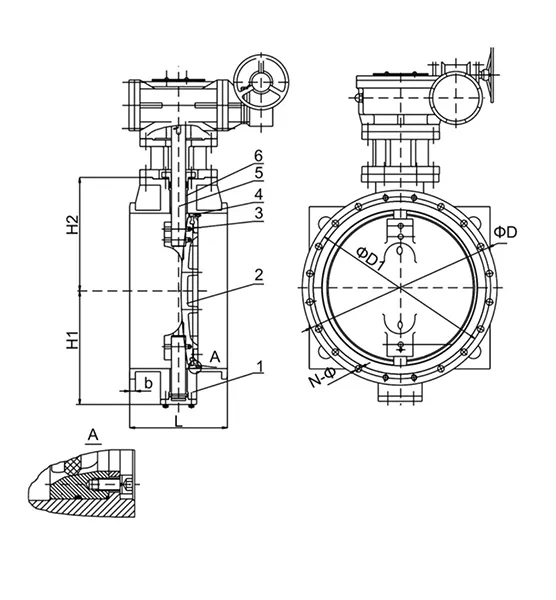ਨਵੰ. . 12, 2024 18:40 Back to list
ss ball valve
Understanding SS Ball Valves Applications, Advantages, and Considerations
Stainless steel (SS) ball valves are integral components in various industrial processes, recognized for their reliability, durability, and efficiency in controlling the flow of liquids and gases. Unlike other valve types, ball valves utilize a spherical disc to facilitate the flow, leading to unique advantages in numerous applications.
What is a Ball Valve?
A ball valve is essentially a quarter-turn valve that uses a hollow, perforated, and pivoting ball to control flow. When the valve is open, the hole in the ball aligns with the flow direction, allowing fluid to pass through. When closed, the ball turns 90 degrees, blocking the flow completely. This simple yet effective design enables rapid shutoff and facilitates a tight seal, preventing leaks.
Why Stainless Steel?
Stainless steel is favored for ball valves due to its excellent corrosion resistance, high temperatures, and durability in harsh environments. Common stainless steel grades used in ball valves include SS304 and SS316. The former is often used in mild corrosive environments, while SS316 offers superior resistance, making it suitable for more severe conditions, including chemical processing and marine applications.
Key Applications of SS Ball Valves
1. Oil and Gas Industry SS ball valves are critical in upstream, midstream, and downstream operations. They control the flow of hydrocarbons, natural gas, and other fuels, ensuring safety and efficiency throughout the process.
2. Water Treatment In water treatment facilities, these valves are utilized to manage the flow and chemical dosing, ensuring safe drinking water production.
3. Food and Beverage The food industry requires strict hygiene and safety standards. Stainless steel ball valves comply with these standards, preventing contamination and ensuring the integrity of food products.
4. Chemical Processing With their excellent resistance to corrosion and chemicals, SS ball valves are widely used in chemical plants for transporting various fluids, including acids and solvents.
5. Pharmaceuticals SS ball valves are crucial in the pharmaceutical sector, where contamination must be avoided, and precise flow regulation is necessary during production processes.
Advantages of SS Ball Valves
ss ball valve

- Durability Stainless steel’s inherent properties ensure that SS ball valves can withstand extreme temperatures and pressures, making them reliable over long-term use.
- Flow Efficiency The design of ball valves allows for minimal pressure drop, ensuring efficient flow characteristics. This makes them suitable for throttling and regulating flow in various applications.
- Quick Operation With only a quarter-turn to open or close, SS ball valves provide rapid response times, facilitating quick adjustments during operations.
- Low Maintenance Due to their simple design and quality materials, SS ball valves generally require less maintenance compared to other valve types, reducing operational costs over time.
- Versatility SS ball valves can be manufactured in various sizes and configurations, making them adaptable to different industry requirements and applications.
Considerations When Choosing SS Ball Valves
While SS ball valves offer numerous advantages, certain factors should be considered when selecting the appropriate valve for specific applications
1. Material Compatibility Ensure that the selected stainless steel grade is compatible with the media being transported. For highly corrosive substances, SS316 is often the better choice.
2. Pressure and Temperature Ratings It is essential to verify that the valve can withstand the pressure and temperature conditions of your application to prevent failures.
3. End Connections Different end connections (such as threaded, flanged, or welded) may be required based on the system design, so it is vital to consider this during selection.
4. Maintenance Requirements While ball valves typically require less maintenance, it is still important to establish a routine inspection and maintenance schedule to ensure optimal performance.
Conclusion
SS ball valves offer a perfect combination of durability, efficiency, and versatility, making them a preferred choice in various industries ranging from oil and gas to pharmaceuticals. Understanding their applications, advantages, and the factors to consider when selecting the right valve can help ensure seamless operations and high safety standards. As industries continue to evolve, the importance of high-quality components such as stainless steel ball valves cannot be overstated. Investing in reliable ball valves is essential for optimizing performance and ensuring operational success.
Share
-
Reliable Wafer Type Butterfly Valves for Every IndustryNewsJul.25,2025
-
Reliable Flow Control Begins with the Right Ball Check ValveNewsJul.25,2025
-
Precision Flow Control Starts with Quality ValvesNewsJul.25,2025
-
Industrial Flow Control ReliabilityNewsJul.25,2025
-
Engineered for Efficiency Gate Valves That Power Industrial PerformanceNewsJul.25,2025
-
Empowering Infrastructure Through Quality ManufacturingNewsJul.25,2025